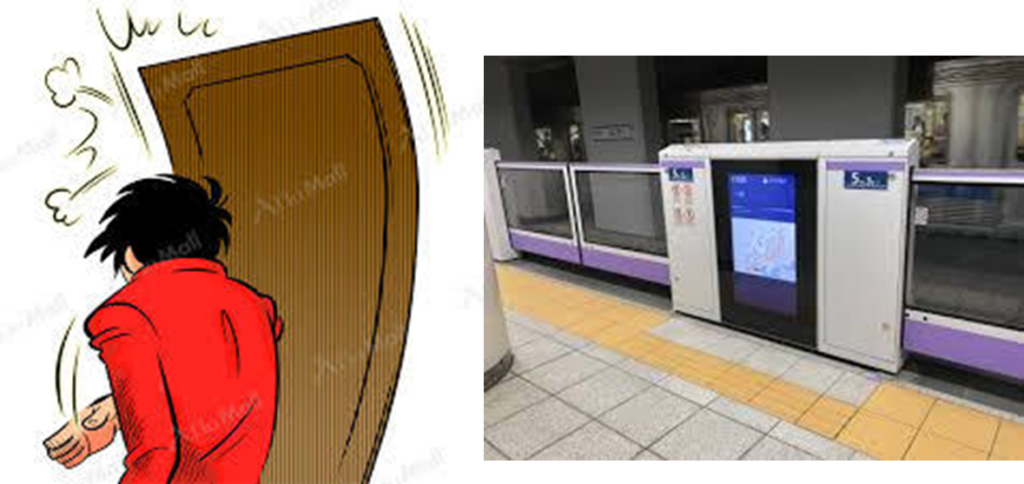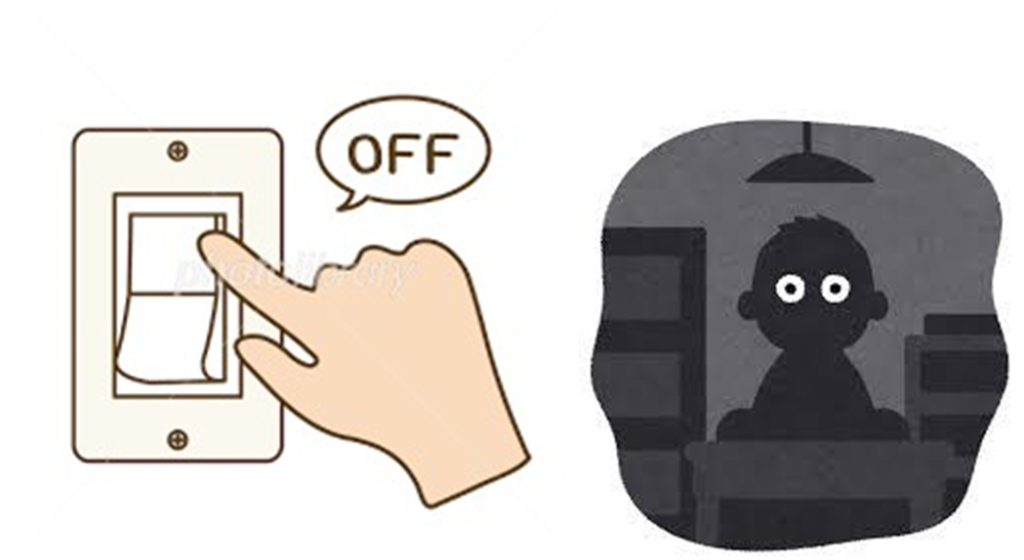
Nが(V(自動詞)て形)います
N is Vte
文型-1
Sentence style-1

ドアを開けます、「(私が)ドアを開けます。」
I open the door.
ドアが開きます、「ドアが(自分で)開きます。」
The door opens.

ドアを閉めます、「(私が)ドアを閉めます。
I close the door.
「ドアを閉めます。」ドア、自分じゃありません。
I close the door. The door is not itself.
ドアが閉まります、「ドアが(自分で)閉まります。」
The door closes, “The door closes (by itself).”
ドア、自分です。
The door, itself.

電気を消します、「(私が)電気を消します。」
I put off the light.
電気、自分じゃありません
The light, is not itself
雷です。宿題しています。
It’s lightning. I’m studying my homework.
電気が消えます、「電気が(自分で)消えます。」怖いです。
The electricity goes out, “The electricity goes out (by itself).” I’m scared.
私、消していません。 電気、自分で 消えます。
I haven’t put off it. The light turns off by itself.
動詞は、他(自分じゃないもの)がして変わるもの、
Transitive verbs are things that change with others (not itself),
自分で変わるものがあります。
Intransitive verbs are things that change with itself.
導入2
Introduction2

ドアが 開いています。
The door is open.
ドアを あけます?
ドアが あきます?
The door is open.
いつ? 今
When ? Now
ドアが あいています
The door is open
いつドアが開きました。いつドアを開けました。わかりません。
When was the door open? When did you open the door? I don’t know.
ドアが開いています。
The door is open.

ドアが 閉まって います。
The door is close.
今日は、 「Nが<Vて形>います」の勉強をやります。
We study ” N is Vte” today.
⇒ これは、前にあったことで 今 そうなっていることです。
It represents the state of the result of what happened before the point in time.
絵で導入・絵で練習の目次41
「自動詞・他動詞」もいっしょに読みたい。
例文‐1
Example-1

お車の ライトが ついています。
The car light is on.
お車へ お戻りください。
Please return to your car.
お車の ライトが ついています。
Nは(V(自動詞)て形)います
N is Vte
例文-2
Example-2

この お肉 変な 臭いが しますね。
This meat has a strange smell.
その お肉 腐っています。
The meat is rotten.
食べないで ください。
Please do not eat.
「Nは<V(て形)>います」 ⇒ 話し手と聞き手の間で話題になっているNがどうなっているのかを説明します。
It explains what does it happen talked about between the speaker and the listener.
その お肉 腐っています。
絵で導入・絵で練習の目次42
「~ている(結果)」もいっしょに読みたい。
(Vて形)しまいます/しまいました(完了)
got it/finished it.
例文-3
Example-3

お腹が すきました。
I’m humgry
京都の お土産の 八ッ橋 まだ ありますか。
Do you still have Yatsuhashi, a souvenir from Kyoto?
全部 食べて しまいました。
We ate everything.
「<Vて形>しまいます/しまいました(完了)」
got it/finished it.
⇒ あることを 完全に 終了して しまった ことを 表します。
It means that something has been completely completed.
全部 食べて しまいました。
例文-4
Example-4

もう 出ませんか。
Do not go out anymore.
すみません。 この アイスコーヒーを 飲んで しまいますから、
Excuse me. I’ll drink up this iced coffee.
ちょっと 待って ください。
Just moment.
この アイスコーヒーを 飲んで しまいますから
(Vて形)しまいました(遺憾)
(Vte)ed (Regret)
文型-2
Sentence style-2

買い物に 行きました。
I bought an umbrella at a department store yesterday.
野菜ジュースを 頼まれていました。
I was asked for vegetable juice.

野菜ジュース 買って来て くれた?
Did you buy some vegetable juice?
私は 野菜ジュースを 買い忘れて しまいました。 残念です。
I forgot to buy vegetable juice. I regret.
「<Vて形>しまいました」 ⇒ ed
がっかりした
I disappointed.
私は 野菜ジュースを 買い忘れて しまいました。
例文-5
Example-5

N3の 試験には 合格しましたか。
Did you pass the N3 exam?
いいえ、 落ちて しまいました。
No, it has fallen.
あんなに 頑張ったんですが…次回また 頑張ります。
I did my best so much … I will do my best again next time.
いいえ、 落ちて しまいました。
例文-6
Example-6

どう したんですか。
What happened.
飛行機の チケットを なくして しまったんです。
I lost my plane ticket.
大丈夫ですよ。 空港に行って カウンダーで 言ってください。
No problem. Go to the airport and say at your counter.
飛行機の チケットを なくして しまったんです。
絵で導入・絵で練習の目次43
「~てしまう」もいっしょに読みたい。
ことばを覚えよう。

漢字の練習をしよう。

文の形を覚えよう。

耳で覚えよう。

日本語教師 教師用教案


コメント